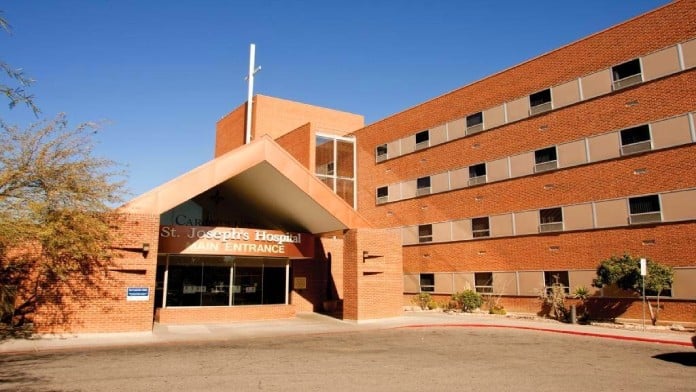Nurses are professional and compassionate, at least they were like that to me, and techs were informative and professional. They tune in with their patients, even though they are crowded and busy all ran smoothly with them. May God bless each and every single one of you!
About Carondelet Health Network – St. Joseph’s Hospital
Carondelet Health Network - St. Joseph’s Hospital, located in Tucson, Arizona, offers mental health treatment to individuals struggling with a wide variety of behavioral health issues. If addiction is the primary diagnosis, a referral may need to be placed to an alcohol or drug rehab center that focuses on addiction treatment.
Carondelet Health Network – St. Joseph’s Hospital, located in Tucson, Arizona, offers mental health treatment to individuals struggling with a wide variety of behavioral health issues. If addiction is the primary diagnosis, a referral may need to be placed to an alcohol or drug rehab center that focuses on addiction treatment.
Carondelet Health Network – St. Joseph’s Hospital provides services for adults and the geriatric population. Their services include detox and inpatient treatment.
Detox
The detoxification program is a medically supervised detox program that provides a safe environment for cleansing the body of addictive substances. Psychiatric and medical evaluations, medication monitoring, and crisis-intervention services are provided.
Inpatient Treatment
The inpatient program offers stabilization services, individual therapy, group therapy, family therapy, psychiatric care, medical evaluations, and geriatric support services.
Private Insurance
Carondelet Health Network – St. Joseph’s Hospital accepts most insurance plans, including Anthem, Wellmark, Blue Cross Blue Shield, Magellan, Amerigroup, Aetna, Cigna, and ComPsych. Out of network benefits may vary, so it is important to verify insurance coverage with your provider prior to enrolling in treatment.
Facility Overview
Latest Reviews
Rehab Score
Gallery

Location
Accepted Insurance
Other Forms of Payment
Private insurance refers to any kind of healthcare coverage that isn't from the state or federal government. This includes individual and family plans offered by an employer or purchased from the Insurance Marketplace. Every plan will have different requirements and out of pocket costs so be sure to get the full details before you start treatment.
Self-pay involves paying for treatment out of your own pocket. You can use savings or credit, get a personal loan, or receive help from family and friends to fund your treatment. If you don't have insurance or your insurance plan doesn't cover a specific program, self-pay can help ensure you still get the care you need.
Medicare is a federal program that provides health insurance for those 65 and older. It also serves people under 65 with chronic and disabling health challenges. To use Medicare for addiction treatment you need to find a program that accepts Medicare and is in network with your plan. Out of pocket costs and preauthorization requirements vary, so always check with your provider.
Addiction Treatments
Levels of Care
Treatments
The goal of treatment for alcoholism is abstinence. Those with poor social support, poor motivation, or psychiatric disorders tend to relapse within a few years of treatment. For these people, success is measured by longer periods of abstinence, reduced use of alcohol, better health, and improved social functioning. Recovery and Maintenance are usually based on 12 step programs and AA meetings.
Drug rehab in Arizona is the process of treating individuals who are dependent on a particular addictive drug. Because addiction is complex, this treatment typically includes a variety of interventions that address the many physical and emotional issues involved.
Many of those suffering from addiction also suffer from mental or emotional illnesses like schizophrenia, bipolar disorder, depression, or anxiety disorders. Rehab and other substance abuse facilities treating those with a dual diagnosis or co-occurring disorder administer psychiatric treatment to address the person's mental health issue in addition to drug and alcohol rehabilitation.
A combined mental health and substance abuse rehab has the staff and resources available to handle individuals with both mental health and substance abuse issues. It can be challenging to determine where a specific symptom stems from (a mental health issue or an issue related to substance abuse), so mental health and substance abuse professionals are helpful in detangling symptoms and keeping treatment on track.
Programs


Clinical Services
Research clearly demonstrates that recovery is far more successful and sustainable when loved ones like family members participate in rehab and substance abuse treatment. Genetic factors may be at play when it comes to drug and alcohol addiction, as well as mental health issues. Family dynamics often play a critical role in addiction triggers, and if properly educated, family members can be a strong source of support when it comes to rehabilitation.
Group therapy is any therapeutic work that happens in a group (not one-on-one). There are a number of different group therapy modalities, including support groups, experiential therapy, psycho-education, and more. Group therapy involves treatment as well as processing interaction between group members.
In individual therapy, a patient meets one-on-one with a trained psychologist or counselor. Therapy is a pivotal part of effective substance abuse treatment, as it often covers root causes of addiction, including challenges faced by the patient in their social, family, and work/school life.
Staff & Accreditations
Staff

Carondelet Health Network Market CEO

Carondelet Health Network Market CMO

Carondelet Health Network Chief Strategy Officer

Market Chief Human Resources Officer

Market Compliance Officer

Market Chief Nursing Officer, St. Joseph’s Chief Nursing Officer

St. Joseph’s Hospital CFO
Accreditations

The Joint Commission, formerly known as JCAHO, is a nonprofit organization that accredits rehab organizations and programs. Founded in 1951, the Joint Commision's mission is to improve the quality of patient care and demonstrating the quality of patient care.
Joint Commission Accreditation: Yes
Contact Information
350 N. Wilmot Road
Tucson, AZ 85711









